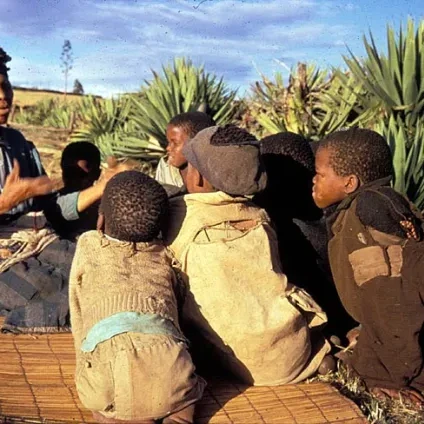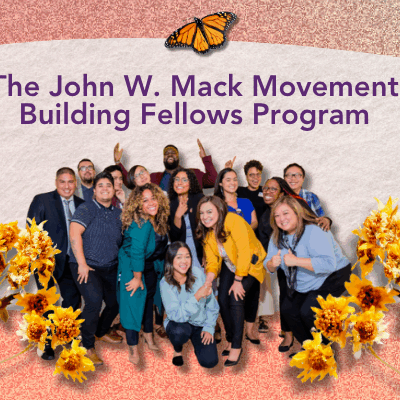Mercy Abdulsalam’s reflections on Weaving Networks for Women Survivors is part of Network Weaver’s BIPOC Editorial series. Learn more about the series and our submissions guidelines here. We invite you to connect with us at [email protected]
Weaving networks has been central to my work, particularly in uniting women from diverse backgrounds to build collective strength. In Africa, where communities are often divided by ethnicity, religion, and socioeconomics, this requires intentionality. My role has been to connect survivors of trauma, grassroots leaders, and changemakers to foster a shared vision of empowerment and liberation. I focus on aligning resources with needs, identifying women with leadership potential, and equipping them to lead trauma-healing circles and build enterprises that uplift others. At its core, network weaving is about honoring our interconnectedness, nurturing relationships, and creating spaces where marginalized voices can unite and thrive.
For over a decade, I carried the scars of three rapes, burdened by the cultural stigma that demanded silence from women like me. Growing up in northern Nigeria, where discussions about sexual assault were taboo, I endured a trauma compounded by societal expectations. Victims were often blamed, and women were expected to quietly bear their pain to protect the honor of men and traditions. For years, I believed there was no safe space to voice my suffering.
My healing journey began when I met my husband, who believes in the inherent dignity of women and advocates for social justice. His unwavering support empowered me to confront my trauma, reclaim my strength, and ultimately share my story. In transforming my pain into a source of empowerment, I discovered the importance of creating spaces where others could do the same.
Inspired by my experiences, I founded Sister, Let’s Talk & Pray in 2021. What began as a small, informal support group of 11 women survivors of sexual assault in Abuja, Nigeria, has grown into a dynamic transnational network. This evolution was deeply rooted in the organic weaving of relationships within a community of shared pain and resilience. Initially, women joined through word of mouth, drawn by the promise of a safe space to share their stories and begin healing. Over time, the group’s success attracted local advocates, spiritual leaders, and trauma specialists, further enriching our approach.
As we expanded to 13 communities across Nigeria, the informal bonds of support evolved into a professional network. We formalized our programs, introduced structured trauma-healing workshops, and partnered with grant organizations to equip women with skills and resources for economic independence. Today, Sister, Let’s Talk & Pray is not only a space for healing but also a platform for professional collaboration and leadership development. Our members are no longer just survivors—they are mentors, advocates, and entrepreneurs weaving new networks of empowerment in their own communities.Our mission is twofold: to provide emotional and spiritual support for survivors and to equip them with practical skills to rebuild their lives and achieve economic independence.
One powerful example of our impact is Amina, a mother of three who had endured years of domestic violence. When she first joined our group, Amina felt hopeless and broken. Through our trauma-healing workshops and grant-writing training, she secured a $1,000 microgrant to start her tailoring business. Today, not only has she rebuilt her life, but she also employs two women and has trained six more in tailoring. Amina’s story is a testament to the power of community support and empowerment.
Since our inception, Sister, Let’s Talk & Pray has facilitated the development of 15 small businesses across Nigeria, helping women transition from survivors to thriving entrepreneurs. Approximately 28% of our members have secured seed grants totalling $12,000 to start their ventures. These grants do more than provide financial assistance; they restore dignity and create sustainable pathways to economic independence. By fostering community-based solutions, we are dismantling oppressive systems and giving women the tools to reclaim their lives.
Inclusivity has been a guiding principle in our journey toward equity and liberation. From the start, I prioritized engaging women from diverse ethnic, religious, and socioeconomic backgrounds. Each woman’s experience is unique, so we tailor our programs to meet their specific needs. For instance, we offer trauma-informed counselling and culturally sensitive spiritual support, collaborating with experts to ensure comprehensive care. This holistic approach fosters healing deeply rooted in the realities of the women we serve.
The moments of collective healing and empowerment embody true liberation—not merely freedom from oppression but the power to reclaim one’s identity, restore hope, and lift others up. Through Sister, Let’s Talk & Pray, I have witnessed the strength that emerges when women share their stories and find solidarity. The networks we weave across borders are lifelines of shared strength, resilience, and collective liberation.
As I reflect on my journey, I am reminded that leadership is about standing in solidarity with others. It involves creating spaces where silenced voices can be heard and where healing can take root. Sister, Let’s Talk & Pray exemplifies the power of collective action. Together, we are building a future where women can live free from fear, reclaim their power, and lead with courage and purpose. This vision of liberation is rooted in the belief that every woman deserves to be heard, seen, and able to thrive. I remain committed to this work, weaving networks of support that empower generations to come.
Below are a few networks and organizations in Nigeria and other parts of Africa that focus on network weaving and supporting survivors of violence, as well as empowering women and communities through collective action. These organizations could serve as great resources for those looking to get involved or support network weaving across Africa:
Women for Women International (Nigeria)
This organization supports women survivors of war, conflict, and other forms of gender-based violence. They have a strong focus on economic empowerment and building a network of resilient women who can support one another through their journeys of healing and growth.
The African Women’s Development Fund (AWDF)
AWDF is a pan-African grantmaking foundation that funds women’s rights organizations across Africa. It has a history of supporting network-based initiatives and grassroots organizations that focus on women’s empowerment, gender equality, and social justice.
This organization works in a number of African countries and is deeply committed to promoting gender equality, women’s rights, and social justice. They have programs that involve building networks of community leaders and women activists who work on issues like women’s health, education, and leadership.

Mercy Abdulsalam is a seasoned advocate and emerging policy legislator with over 10 years of experience in grassroots development, focusing on empowering women and youth. As the founder of Sister, Let’s Talk & Pray, she has created transformative spaces for survivors of sexual assault to heal, reclaim their voices, and achieve economic independence. Her work has directly impacted over 35 diverse communities in Africa, driving meaningful change through trauma-informed care, skills training, and community-led solutions.
A passionate advocate for equity and liberation, Mercy bridges cultural and social divides through her activism, writing, and budding career in policymaking. Her compelling narratives amplify marginalized voices and inspire action on critical issues affecting women and youth globally.
When she’s not working, Mercy cherishes time with her family, finding inspiration and joy in their shared moments. Through her leadership, storytelling, and policy initiatives, she continues to challenge systemic barriers, foster resilience, and build a future where diverse communities can thrive with dignity and purpose.
What inspired you to write this particular piece?
This piece was inspired by my personal journey of overcoming trauma and finding empowerment in community. Having experienced the silencing effects of societal stigma, I wanted to shed light on the transformative power of shared stories, healing spaces, and collective action. My work with Sister, Let’s Talk & Pray has been a profound testament to the resilience and strength of women when given the opportunity to reclaim their voices. I felt compelled to honor the courage of the women I’ve encountered and share the importance of building networks that foster empowerment and economic independence.
What does liberation mean to you?
Liberation, to me, is the reclamation of one’s voice, power, and identity in the face of systems and narratives that seek to diminish them. It is not merely freedom from oppression but the creation of spaces where individuals can thrive, contribute, and uplift others without fear or constraint. Liberation is collective; it is rooted in solidarity and the belief that empowering one person strengthens the community as a whole. For women survivors, liberation means not just surviving but thriving, leading, and living with dignity and purpose.
featured image found HERE




